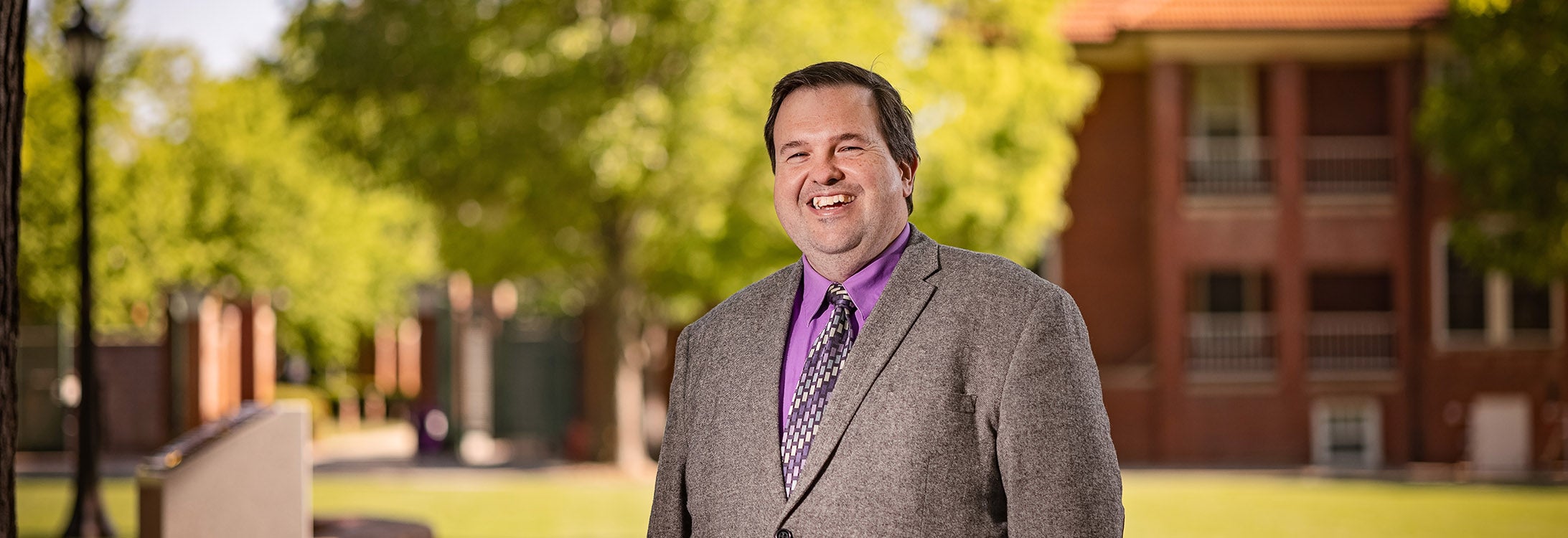MAKING A DIFFERENCE
Castles earns BOG Excellence in Teaching Award
Each year, the UNC Board of Governors selects one professor from each university in the UNC System to receive its Excellence in Teaching Award, which was established in 1994 to “underscore the importance of teaching and to encourage, identify, recognize, reward and support good teaching.”
This year, Dr. Ricky Castles, associate professor of engineering in the East Carolina University College of Engineering and Technology (CET), was named the winner of the Excellence in Teaching Award, which includes a $12,500 stipend and a bronze medallion.
From connecting with students on a personal level to putting his work to use in the community, Castles embodies ECU’s mission of student success and regional transformation. He said CET’s faculty and administration foster a culture that focuses on the students.
“The engineering department really is a family, and we have a great dynamic among the faculty,” he said. “It’s all about trying to figure out what’s the best approach for our students to prepare them for jobs, to get them the support that they need.”
One example of his work toward student success is a $4 million grant from the National Science Foundation Scholarships in Science, Technology, Engineering and Mathematics Program (S-STEM) to support low-income students pursuing undergraduate engineering degrees. Castles is the lead principal investigator on the grant, which provides scholarships of up to $10,000 for students with demonstrated financial need.
The inspiration and motivation to seek the grant came from talking with his students. “I had a student a few years ago who was working 40 hours a week at a grocery store while trying to go to college full time,” Castles said. “He was totally on his own and … he deserves the opportunity to succeed because he’s busting his tail to do the best that he can.”
Those hallway conversations can also provide fodder for the classroom, where Castles tries to make the material accessible by relating it to topics that students understand. When he had ECU baseball player Spencer Brickhouse in class, he centered a lesson about hazard mitigation on the electronics in scoreboards, showing how propagation delay in a circuit can be more critical in one application than another.
“If Brickhouse hits a home run and that one little light that’s supposed to indicate the score flickers for 10 nanoseconds, is that going to be a big deal as everyone’s high-fiving? No,” he said. “But what if a weapons system that’s supposed to deploy a missile has a glitch for one nanosecond?”
In another conversation with a student who loved Disney, Castles explained how industrial and systems engineers developed the fastpass system to reduce lines in the park and streamline the experience. The student went on to earn an internship at Disney and now works as an industrial engineer.
“One of the biggest things that I think has helped me do well in my profession is just taking the time to listen to those students,” said Castles, who came to ECU in 2010 as an instructor and adviser for the engineering department.
A computer engineer by training, Castles’ favorite class to teach and the focus of his own work is microprocessors. He helped develop the electrical engineering concentration at ECU, and his work has also led to collaborations across campus and in the community. He’s worked with faculty in the College of Nursing to develop sensors to track how often bedridden patients are moved in an effort to prevent pressure ulcers.
“Medicare basically says a pressure ulcer is a preventable condition,” he said. “If a hospital has people developing pressure ulcers, they have to treat it, but Medicare’s not going to reimburse it, and that can be thousands of dollars in medical expense.
“So if you have a sensor that can detect and say, reliably, that we turn this patient as often as the standard says we should, (then we have a case) that they should pay for the care of this patient to make sure they get the care they need.”
He’s also worked with Cypress Glen, a Greenville retirement community, to develop a “virtual nurse” — a network of sensors that can track activity patterns and health data, allowing health care workers to know what’s going on with the residents while allowing more independence.
In his award letter to Castles, UNC System President Peter Hans said, “Teaching is the foundation of our mission, and faculty like you are the bedrock of this foundation. I am grateful for the passion, expertise and scholarship you bring to the classroom every day and the impact you have on your students.”
The BOG also recognizes outstanding faculty members with its Distinguished Professor for Teaching Awards, and this year’s recipients from ECU are:
- Dennis Barber III, Miller School of Entrepreneurship
- Holly Wei, Department of Advanced Nursing Practice and Education
- Brittany Myles Wright Thompson, School of Communication
- Tony Thompson, Department of Mathematics Education, Science Education and Instructional Technology
- Jakob F. Jensen, Department of Human Development and Family Science
- David Loy, Department of Recreation Sciences
In student comments from their nomination packets, these instructors were lauded not only for their expertise and creativity, but also for taking the time to invest in and encourage their students.
Visit the UNC System website for the full list of recipients of the 2021 Excellence in Teaching Award.
